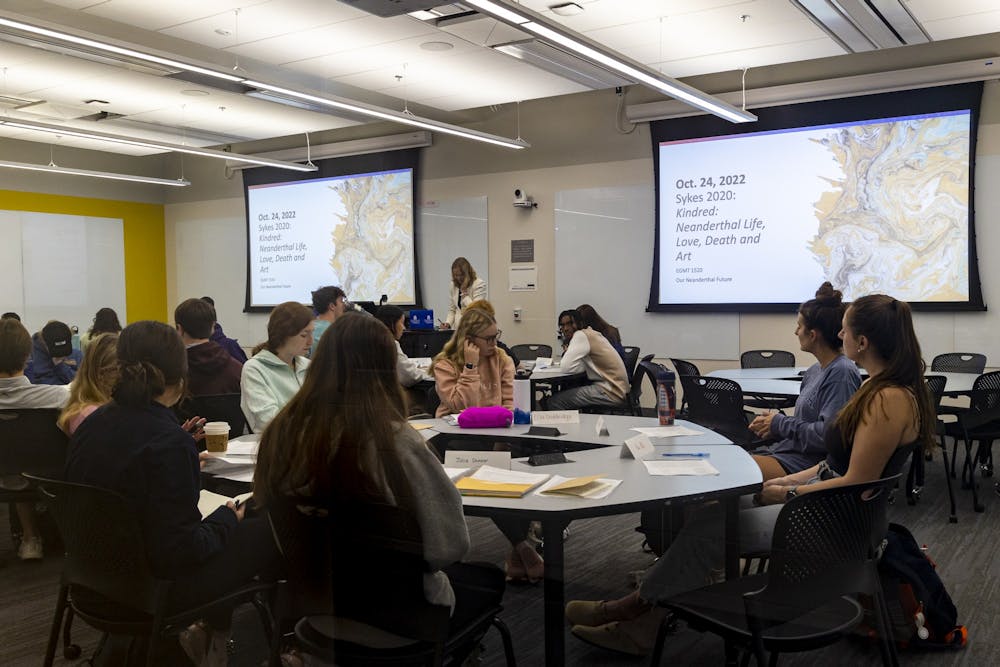When many first-year students went into class registration during orientation, they found much of their schedule filled with pre-enrolled classes called “Engagements.” Starting in the 2023-24 academic year, all students are required to complete the Engagements General Education Pathway. Fundamentally, this program is built on values that the University must center — acceptance, understanding and inclusion. However, these themes are oftentimes not communicated clearly to the students themselves. The Engagements Program teaches first-year students valuable information, but these benefits aren’t being completely delivered — the program must adjust the way this information is presented.
The Engagements program consists of eight credits of generalized classes that are required for many first years to take. These classes cover a myriad of topics in eight-week time frames. Students not in the Engagements Program take generalized requirements on the semester schedule in the Disciplines pathway, which is being phased out in the 2023-24 academic year. Mandating the program means that the University should go above and beyond to address its current issues before every first year is placed into the program. Engagements classes fall into four categories — Ethical Engagement, Engaging Aesthetics, Engaging Differences and Empirical and Scientific Engagement. The goal of this program is to equip first years with the same foundation of knowledge, regarding the values of the program that they can carry with them throughout their college careers. However, I find this value is not entirely imparted upon the students due to a lack of standardization in teaching.
While conversations between first-year students may suggest they view Engagements as just another requirement to complete, the topics tackled by the program are of genuine importance. The program explores areas like self care, enjoyment and imagination — important subjects that have oftentimes been overlooked by the education system. It is clear that modern education is a droll system of capitalist indoctrination, and the fact that several students wouldn’t be able to say that they’ve been regularly intellectually challenged in college is a glaring issue — as such, the University’s prioritization of these topics shows major progress. The Engagements Program also tackles issues that the University has historically overlooked. Classes on colonization, enslavement and genocide are integral to understanding what it means to be a student here. As students here, we are inherently a part of the University’s fraught history — we have a stake in what this institution means. First years have four more years of working and strengthening this community — it is vital that this work is built on a solid foundation of understanding and respect.
Theoretically, the Engagements Program addresses this all. Practically, however, is where it falls short. Students come to college to learn more about topics they’re interested in and further their understanding, which usually comes with more challenging work. However, the value of what they are learning is difficult to truly internalize when students are consistently doing busy work for 75 minutes twice a week. Several students claim that they view their Engagement as an “easy A,” which isn’t a problem until students also fail to grasp the contents of what they are learning. Rather than look forward to learning about a new topic in their Engagement course, several first years share the same complaint that this class is just something to sit through and bear. If material is taught in an apathetic way, it will be learned in an apathetic manner. For a pathway intending to focus on issues integral to the University’s community, this pervasive sense of complacency threatens the success of the program.
Many Engagements are filled with seemingly unrelated lectures and readings, aimless reflections on vague questions and undirected discussions. Because of how different the content of each course is, the way each engagement is taught is different, too. There is not much standardization, and so, students are pulled from one class to another. While each class can have its own curriculum, the relationships between all Engagements first years take lack cohesion. Several students have idyllic experiences with Engagements classes, but more often than not, I have found that first years complain about heading to their Engagement class. Regardless of the topic, students should still feel like the work that they’re doing is valuable. Academic apathy is a general and pervasive problem with the American education system, but if the University wants to continue to be considered an academically innovative institution, it must alter the way that this valuable knowledge is communicated. While the inclusion of these classes is a step in the right direction, the way that this information is conveyed dampens the impact these classes could actually have.
The Engagements Program is simultaneously necessary and flawed. Much of the most valuable content is lost in its delivery, and students frequently question the importance of taking these classes. I often hear other first year students say they are bored in class — failing to understand the importance of what they’re learning. Educational pessimism should never be a standard. There should be no reason for students to hate how they are learning, especially when the content is of such importance. The Engagements Program is a necessary part of the first-year experience, but its structure and delivery needs to be reconstructed. This way first-year students will not only comprehend valuable material, but understand how the program can shape their educational experiences.
Laasya Gadiyaram is a Viewpoint Writer for Academics at The Cavalier Daily. She can be reached at opinion@cavalierdaily.com.
The opinions expressed in this column are not necessarily those of The Cavalier Daily. Columns represent the views of the authors alone.







